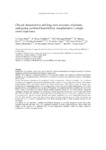Mostrar o rexistro simple do ítem
Clinical Characteristics and Long-term outcomes of patients undergoing combined heart-kidney transplantation: a single-center experience
| dc.contributor.author | López-Sainz, A. | |
| dc.contributor.author | Barge-Caballero, Eduardo | |
| dc.contributor.author | Paniagua-Martín, María J. | |
| dc.contributor.author | Marzoa Rivas, Raquel | |
| dc.contributor.author | Sánchez-Fernández, G. | |
| dc.contributor.author | Fernández Arias, L. | |
| dc.contributor.author | García-Vieites, M. | |
| dc.contributor.author | Alonso-Hernández, Á. | |
| dc.contributor.author | Rodríguez-Rivera-García, J.J. | |
| dc.contributor.author | Crespo-Leiro, María Generosa | |
| dc.date.accessioned | 2017-06-15T10:11:36Z | |
| dc.date.available | 2017-06-15T10:11:36Z | |
| dc.date.issued | 2015-01-30 | |
| dc.identifier.citation | López-Sainz A, Barge-Caballero E, Paniagua-Martin MJ, et al. Clinical Characteristics and Long-term outcomes of patients undergoing combined heart-kidney transplantation: a single-center experience. Transplant Proc. 2015;47(1):123-126 | es_ES |
| dc.identifier.issn | 0041-1345 | |
| dc.identifier.issn | 1873-2623 | |
| dc.identifier.uri | http://hdl.handle.net/2183/19176 | |
| dc.description.abstract | [Abstract] Background. The purpose of the study was to describe clinical characteristics and long-term survival of patients undergoing combined heart-kidney transplant in a single center. Methods. We conducted a retrospective analysis of 22 consecutive patients who underwent combined heart-kidney transplant at our institution between 1995 and 2013. Long-term outcomes were analyzed by means of the Kaplan-Meier method. Results. Four patients underwent re-do transplant (2 cardiac re-transplants, 1 kidney re-transplant, and 1 combined heart-kidney re-transplant). Most frequent underlying cardiac conditions were coronary artery disease (54%), dilated cardiomyopathy (23%), and chronic rejection of a previous heart graft (18%). Known causes of chronic renal dysfunction were nephroangioesclerosis (23%), drug-related toxicity (14%), and Wegener granulomatosis (5%). Non-specified chronic renal dysfunction was present in 50% patients. In-hospital postoperative mortality rate was 5 of 22 (23%). Causes of early death were directly related to kidney transplant surgery in 4 of 5 (80%) patients. Among the remaining 17 patients who surmounted the postoperative period, long-term survival rates 1 year, 5 years, and 10 years after HKT were 88%, 82%, and 65%, respectively. Over a mean follow-up of 6.7 ± 6.4 years, cumulative incidences of cytomegalovirus infection, coronary allograft vasculopathy, malignancy, and acute cardiac graft rejection were 41%, 6%, 24%, and 41%, respectively. There was no episode of acute renal graft rejection. At the end of follow-up, all survivors (n = 11) were in functional New York Heart Association class I. Mean creatinine serum level was 1.68 mg/dL. Conclusions. In our experience, combined heart-kidney transplant is a feasible therapeutic option that yielded favorable long-term outcomes, with a low cumulative incidence of cardiac graft dysfunction. These results were obtained at the expense of a significant risk of early postoperative mortality, which was mainly related to complications of kidney transplant surgery. | es_ES |
| dc.language.iso | eng | es_ES |
| dc.publisher | Elsevier | es_ES |
| dc.relation.uri | http://dx.doi.org/10.1016/j.transproceed.2014.11.009 | es_ES |
| dc.rights | Atribución-NoComercial-SinDerivadas 3.0 España | es_ES |
| dc.rights.uri | http://creativecommons.org/licenses/by-nc-nd/3.0/es/ | * |
| dc.title | Clinical Characteristics and Long-term outcomes of patients undergoing combined heart-kidney transplantation: a single-center experience | es_ES |
| dc.type | info:eu-repo/semantics/article | es_ES |
| dc.rights.access | info:eu-repo/semantics/openAccess | es_ES |
| UDC.journalTitle | Transplantation Proceedings | es_ES |
| UDC.volume | 47 | es_ES |
| UDC.issue | 1 | es_ES |
| UDC.startPage | 123 | es_ES |
| UDC.endPage | 126 | es_ES |
Ficheiros no ítem
Este ítem aparece na(s) seguinte(s) colección(s)
-
INIBIC-ICATC - Artigos [177]






